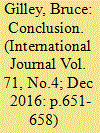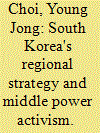| Srl | Item |
| 1 |
ID:
117857


|
|
|
|
|
| Publication |
2012.
|
| Summary/Abstract |
The role of small states has been largely neglected in research on the process and outcome of multilateral negotiations. Even though these states may be active in the agenda-setting processes or display a specific engagement in certain thematic aspects of negotiations, in the end game the outcome of negotiations has been perceived to be dependent on the bargaining between major powers. However, small states also have strategies at their disposal to compensate for these weaknesses. Two principal ones come to mind, prioritization or niche diplomacy, and coalition-building to join forces with like-minded states in order to draw on their resources, expertise and manpower. In the article, we compare two cases of small state coalitions in multilateral negotiations, namely the Like Minded (LM) group in the negotiations that led to the establishment of the International Criminal Court (ICC), and the Alliance of Small Island States (AOSIS) in United Nations climate negotiations. While the two coalitions resort to similar strategies, they have not been comparably successful. We will show that the ability to translate discursive power into measurable effects on outcomes ultimately depends on the institutional setting of the negotiations and the nature of the issue that coalitions are tackling.
|
|
|
|
|
|
|
|
|
|
|
|
|
|
|
|
| 2 |
ID:
151386


|
|
|
|
|
| Summary/Abstract |
The challenges for middle powers relate directly to their unstable positional status in the international system. Yet this unique position in the international Goldilocks Zone of having not too much power but power enough also gives them unique opportunities. Successful middle powers recognize their middle power status and then formulate a strategic diplomacy suited to this status in which they accept the centrality of great power interests and roles. Too many middle powers fail to do this because they entertain delusions of grandeur, and when those delusions are revealed they fall into isolation or disengagement from global governance.
|
|
|
|
|
|
|
|
|
|
|
|
|
|
|
|
| 3 |
ID:
092519


|
|
|